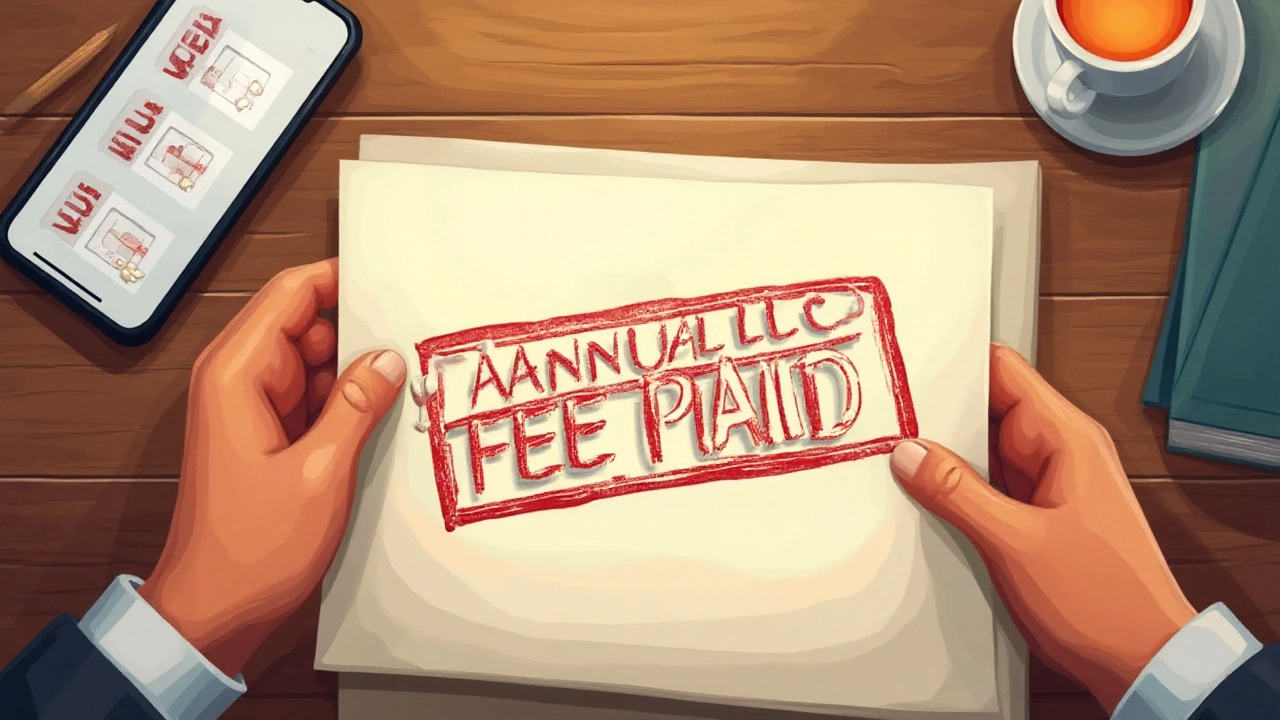Okay, pause—imagine you finally set up your dream LLC in Virginia. You filed all that paperwork, did your little happy dance, and maybe even treated yourself to a fancy coffee. But the emails just keep coming—'Annual Report Due', 'Annual Fee Reminder', 'Did You Forget?' If you’ve ever wondered whether you need to renew your LLC every year in VA, you’re not alone. Here’s where most business owners slip up: thinking it’s a one-and-done deal. Spoiler—it’s not. If you want to keep your LLC alive and kicking past the first year, you’ve got to pay attention to annual renewal requirements. Virginia doesn’t call it a 'renewal' the way some other states do, but yeah, you can’t ignore the annual steps or your whole business could disappear faster than a dropped French fry at a picnic. So, what exactly does Virginia want? Let’s untangle the facts so you don’t get blindsided by one of the state’s infamous $25 late fees or the ultimate business ghosting—administrative dissolution.
What "Renewal" Actually Means for Virginia LLCs
Virginia loves technical terms. Here, the state doesn’t make you file a new application to literally ‘renew’ your LLC every year, but there are annual requirements you absolutely cannot ignore. Here’s the straight truth: every active Virginia LLC must pay an annual registration fee, and if the fee is late, a penalty lands on your lap. Keep missing, and they can shut your business down. The word "renewal" trips up a lot of folks, but the real process is about keeping your registration up-to-date and your LLC in 'good standing'—that’s the actual term Virginia uses.
So, what do you actually have to do? Every Virginia LLC must pay a $50 registration fee each year by the last day of the LLC’s anniversary month. If you registered your LLC on August 14, your fee is due every August 31. The State Corporation Commission (SCC) will remind you, usually by email or snail mail, a couple months beforehand. There’s no separate "annual report" for LLCs in Virginia—unlike corporations, you don’t have to update officers or members each year. That part surprises a lot of people. Really, it’s just the fee, and making sure your registered agent info is accurate. Forget the deadline and the fee jumps by $25, and after three months of dodging it, the state dissolves your LLC—meaning it’s legally dead and you lose protection for your business name and personal liability shield.
This whole annual requirement is less hassle than in states like California or New York, where fees are sky-high and paperwork never seems to end. But don’t let the simplicity fool you—if you skip the $50 fee, everything you built is at risk. About 1 in 8 Virginia LLCs is administratively dissolved each year, often because someone missed the email or forgot about the deadline. You don’t want to find out the hard way, especially if a bank, customer, or the IRS suddenly needs proof your business exists. Here’s a real wake-up stat: in 2024, over 7,400 Virginia LLCs lost their ‘good standing’ from late or missed payments. Don’t be that guy.
Another thing—if you want to do business in other states, banks and partners will check your LLC's "good standing" status in Virginia. Miss your annual payment, and it’ll show up as revoked. You’ll run into problems opening accounts, applying for credit, and even signing bigger contracts. So, even though 'renewal' sounds dramatic, it’s more like paying your yearly rent to the state to keep the business doors open (at least on paper). Treat it like your Netflix subscription—don’t let it expire, or services will vanish fast.

How to Keep Your LLC in Good Standing: Steps, Tips, and Deadlines
So how do you actually pull this off without falling into a bureaucratic black hole? Virginia’s annual LLC fee process is more tech-friendly than people expect. The State Corporation Commission (SCC) has made things way simpler over the past few years, especially since COVID-19 pushed the state government to do more online. Now you can usually handle your annual registration fee in under ten minutes from your phone or laptop. Let’s run through exactly what you have to do so you don’t accidentally drop the ball.
First step: mark your LLC’s anniversary month in every digital calendar you own. You can find your LLC’s anniversary by checking your Articles of Organization or looking it up on the SCC’s Business Entity Search site. The SCC starts sending out renewal reminders about two months before your fee is due. But don’t rely on snail mail. Mail gets lost. Life gets busy. The best hack? Set up two digital reminders—a week before the deadline, and three days before. Trust me, your future self will thank you.
Here’s what you need for the payment:
- Your SCC business ID number (find it on past emails or via the SCC lookup tool)
- Valid payment method—usually credit or debit card
- Registered agent’s current info (double-check this every year)
Just go to the SCC’s Clerk’s Information System, log in, and find your business profile. If you’re doing this for the first time, you might have to create an online account. But the state’s site is decent—no jargon, no six-page instructions. In a few clicks, you’ll see the fee balance due and you can pay there. Once paid, you get a receipt instantly—save this in your business docs.
Here’s a pro tip: if you hire a registered agent service, lots of them will also help remind you of fee deadlines each year, or even file and pay for you (for a small extra charge). This can be a lifesaver if you’re the forgetful type or manage more than one company. According to data tracked by registered agent companies, LLCs with automatic reminders are 70% less likely to lose good standing.
What if you mess up and forget the deadline? Virginia gives you a little grace period. You have up to three months to pay, but after the deadline, the $25 penalty is automatic—no getting around it. After the grace window? The SCC will administratively dissolve your LLC, which is a headache and a half to fix. Reviving a dissolved LLC means paying all past-due fees and penalties and filing paperwork called Articles of Reinstatement. It can cost a lot in lost business and time. So stay on top of those reminders and save copies of everything you pay.
| Year | Active VA LLCs | LLCs Losing Good Standing | % Dissolved by State |
|---|---|---|---|
| 2021 | 620,000 | 6,500 | 1.05% |
| 2022 | 654,000 | 7,020 | 1.07% |
| 2023 | 698,000 | 7,430 | 1.06% |
| 2024 | 736,000 | 7,400 | 1.00% |
Lastly, double-check that your registered agent’s info is always current with the state. If you change who your agent is or switch your business address, you must update it on the SCC site. Failing to have a valid registered agent can get your LLC dissolved too. Virginia makes this easy to update online, and there’s a small fee. You don’t want to miss a lawsuit notice or tax letter because it went to your old accountant instead of your new one. That sort of drama is easily avoidable.

Little-Known Traps, Tax Tips, and What Happens If You Forget
Now for the stuff most guides leave out. Most people think renewing your LLC is boring paperwork, but the real curveballs are always in the small print. One of the sneakiest traps is forgetting that "good standing" isn’t just about state records—it also shows up when you apply for business loans, get lines of credit, or try to sell your company. More than half of Virginia banks will check your LLC’s status before approving any business financing. If your LLC isn’t in good standing—even for something as minor as a missed $50 fee—they can deny your app, freeze your account, or revoke a line of credit. Why risk it?
If you’re hoping to scale up, another tip: some government contracts and larger private vendors require you to submit a certificate of good standing. These are only issued if you’ve paid all your annual fees and kept your state records clean. Cost for the certificate isn’t high—usually around $6 online—but if your business isn’t current, you’ll get rejected straight out. LLCs in the construction, government services, and tech procurement fields run into this all the time. Missed fees mean lost deals.
Watch out for spam, too. A shady cottage industry has popped up with ‘renewal’ scams that mail official-looking letters urging you to pay an extra fee for ‘renewal processing.’ Look for the real sender: only pay via the State Corporation Commission’s official channels. Virginia’s official site is ‘cis.scc.virginia.gov’—ignore everything else. In 2023, the SCC reported over 1,000 complaints about scam renewal notices.
A lot of folks mix up the state registration fee with Virginia’s annual business taxes. They’re separate. The annual LLC fee is $50—end of story. But if you make income in Virginia, you still need to pay state taxes (corporate income tax, sales tax, or withholding if you have employees). For single-member LLCs, remember to file on your personal return. Multi-member LLCs file Form 502 (partnership returns). Keeping up with your 'good standing' doesn’t give you a tax break, but if you fall behind on taxes, your business is in just as much hot water. Want a trick? Some modern accounting apps can download SCC annual fee payment receipts so everything stays in one place at tax time.
Say you dropped the ball and your LLC gets dissolved. Don’t panic—you can usually reinstate it if you act quickly. The SCC lets you file Articles of Reinstatement online or by mail, but you need to pay all missing fees, penalties, and fix any outdated registered agent info. If another business scoops up your name during the gap, you might have to pick a new one. That can be a branding nightmare if you’ve built up a good reputation, so act fast if you get dissolution papers.
And here's one overlooked upside to the Virginia system: no surprise annual 'report' document. Some states have long forms asking for lists of members and business addresses every year. In Virginia, if you keep your registered agent info current and pay the $50 on time, you’re set. That’s why a lot of out-of-state entrepreneurs form LLCs here—less red tape, fewer hassles, fewer expensive mistakes. Just set an annual reminder, hit that payment link, and your LLC keeps humming into the next year.
Here’s a last smart habit: download your paid fee receipt and the SCC record showing your good standing every year. Save it to Google Drive or wherever you keep business records. You won’t need it often, but when you do, you’ll be glad you have proof ready for the bank, IRS, or that new client who wants confirmation your company’s legit. Getting your LLC into good standing after a dissolution is way more stressful than staying current.
Bottom line? The LLC renewal VA process in 2025 is quicker and lighter than in most states, but just as critical for keeping your business protected. Set those reminders. Skip the spam. Pay the $50 on time. And keep your dream LLC living to see all your future wins in Virginia.

